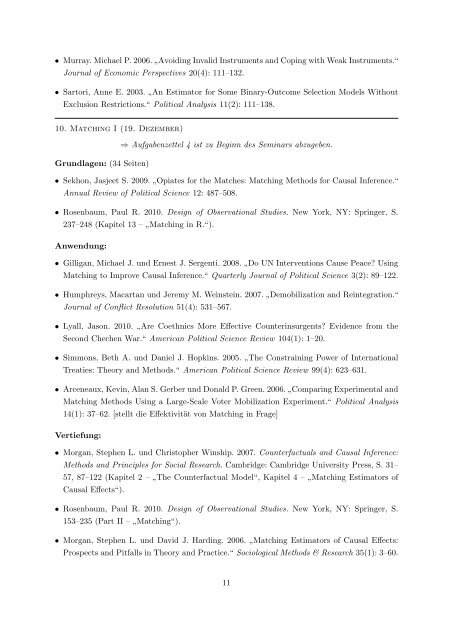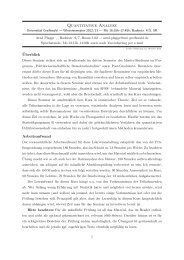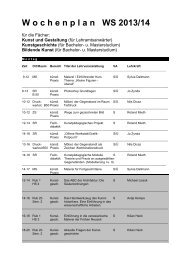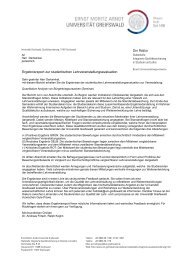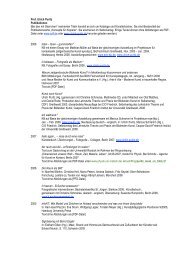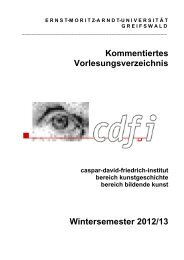Quantitative Analyse von Internationalen Beziehungen
Quantitative Analyse von Internationalen Beziehungen
Quantitative Analyse von Internationalen Beziehungen
Sie wollen auch ein ePaper? Erhöhen Sie die Reichweite Ihrer Titel.
YUMPU macht aus Druck-PDFs automatisch weboptimierte ePaper, die Google liebt.
• Murray. Michael P. 2006. Avoiding Invalid Instruments and Coping with Weak Instruments.“<br />
”<br />
Journal of Economic Perspectives 20(4): 111–132.<br />
• Sartori, Anne E. 2003. An Estimator for Some Binary-Outcome Selection Models Without<br />
”<br />
Exclusion Restrictions.“ Political Analysis 11(2): 111–138.<br />
10. Matching I (19. Dezember)<br />
⇒ Aufgabenzettel 4 ist zu Beginn des Seminars abzugeben.<br />
Grundlagen: (34 Seiten)<br />
• Sekhon, Jasjeet S. 2009. Opiates for the Matches: Matching Methods for Causal Inference.“<br />
”<br />
Annual Review of Political Science 12: 487–508.<br />
• Rosenbaum, Paul R. 2010. Design of Observational Studies. New York, NY: Springer, S.<br />
237–248 (Kapitel 13 – Matching in R.“).<br />
”<br />
Anwendung:<br />
• Gilligan, Michael J. und Ernest J. Sergenti. 2008. Do UN Interventions Cause Peace? Using<br />
”<br />
Matching to Improve Causal Inference.“ Quarterly Journal of Political Science 3(2): 89–122.<br />
• Humphreys, Macartan und Jeremy M. Weinstein. 2007. Demobilization and Reintegration.“<br />
”<br />
Journal of Conflict Resolution 51(4): 531–567.<br />
• Lyall, Jason. 2010. Are Coethnics More Effective Counterinsurgents? Evidence from the<br />
”<br />
Second Chechen War.“ American Political Science Review 104(1): 1–20.<br />
• Simmons, Beth A. und Daniel J. Hopkins. 2005. The Constraining Power of International<br />
”<br />
Treaties: Theory and Methods.“ American Political Science Review 99(4): 623–631.<br />
• Arceneaux, Kevin, Alan S. Gerber und Donald P. Green. 2006. Comparing Experimental and<br />
”<br />
Matching Methods Using a Large-Scale Voter Mobilization Experiment.“ Political Analysis<br />
14(1): 37–62. [stellt die Effektivität <strong>von</strong> Matching in Frage]<br />
Vertiefung:<br />
• Morgan, Stephen L. und Christopher Winship. 2007. Counterfactuals and Causal Inference:<br />
Methods and Principles for Social Research. Cambridge: Cambridge University Press, S. 31–<br />
57, 87–122 (Kapitel 2 – The Counterfactual Model“, Kapitel 4 – Matching Estimators of<br />
” ”<br />
Causal Effects“).<br />
• Rosenbaum, Paul R. 2010. Design of Observational Studies. New York, NY: Springer, S.<br />
153–235 (Part II – Matching“).<br />
”<br />
• Morgan, Stephen L. und David J. Harding. 2006. Matching Estimators of Causal Effects:<br />
”<br />
Prospects and Pitfalls in Theory and Practice.“ Sociological Methods & Research 35(1): 3–60.<br />
11


